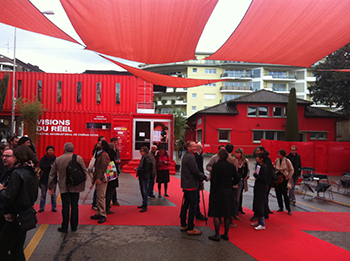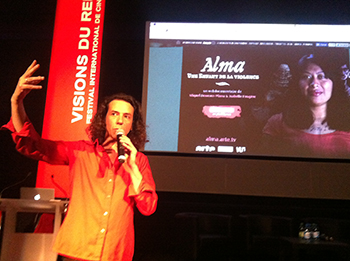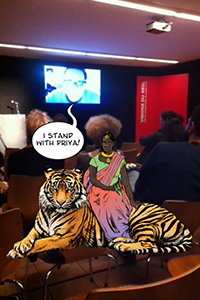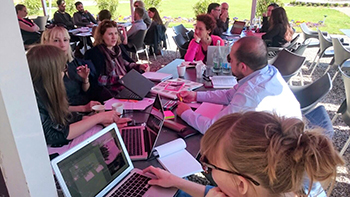“Describe in one word the 2015 i_docs_workshop”
“Unique. Enabling. Inspiring…”
 Okay, okay, I’ve broken the rules and used three, but sometimes you’re compelled to push the boundaries beyond what’s expected. This was certainly the case at the i_docs_workshop at this year’s Visions du Réel, Nyon.
Okay, okay, I’ve broken the rules and used three, but sometimes you’re compelled to push the boundaries beyond what’s expected. This was certainly the case at the i_docs_workshop at this year’s Visions du Réel, Nyon.
We’re back in the office after 5 intense working days in the extraordinary surroundings of Chateau Bossey in Nyon. Marieke, our head of Docs and myself, Rose, Producer-Director, were lucky enough to take part in this Project Development Programme for Expanded Documentaries that runs concurrently with the festival Visions du Réel. True to the festival’s avantguardist nature, Suzanna Holtz and Jean-Pierre Candeloro dished up an enlightening and provocative programme under the wing of Supsi University. Packed to bursting point with classes, case studies and development labs, every one of the 13 projects attending came out of the process stronger, more interesting and most importantly: more meaningfully interactive.
Jiannis Sotiropoulos from Honig Studios, Berlin kicked off the workshop with a very down to earth introduction to interactive storytelling. This independent, collaborative studio quite often leads their productions itself, side-stepping lengthy negotiations with traditional commissioners and broadcasters, opting for private investments and sales business models with in-built returns. Recent projects range from webdoc Atterwasch to children’s app Milli, to online game The Spiral.

Next up was the enfant terrible of interactive documentary, Alexandre Brachet of Upian. A pioneer of interactive content since 1998, we were given an insider view to pinnacle pieces such as Gaza-Sderot, Alma and their current project Do not track, an interactive series that really chimed a bell for us since it’s subject matter, privacy on the web, takes up the baton just where Polar Star Films’ Google and the World Brain and facebook app The World Brain left off. In the round table discussion afterwards Alexandre put the commissioning editors on the spot arguing that it’s the duty of the public sector to offer quality content to counterbalance the overwhelming flood of commercially driven content available. One of the biggest challenges for producers is financing interactive projects in comparison to linear films.
James Pallot from Emblematic Group propelled us into the future at the same time as giving us a sharp reality check with Nonny de la Peña’s virtual reality reportage. These immersive reporting pieces build a virtual reality from limited source material, such as a mobile phone recording of an unpunished crime, in order to promote awareness of the incident and question the course of justice. Despite the tiny audiences that these tech heavy experiences can reach, requiring a motion capture viewing area and with only 4 hand-built head-mounted devices (HMDs) in existence, the quality and the value of the experiences cannot be negated. One of the most interesting distribution strategies has been in the selection of their audiences, early this year they invited journalists from Buzzfeed to experience the project Use of Force without any former knowledge of what they were about to witness. The response was incredible, full body interaction, shouting and being brought to tears. Their latest piece, Project Syria
premiered at the Davos World Economic Forum, meaning that a good number of the world’s most important politicians were there to experience it first hand.

Director Ram Devineni, via skype, and co-producer Christian Popp presented the extraordinary social impact project that is Priya’s Shakti. The project mashes up Hindu belief and augmented-reality in a comic book that draws on the retro and the vanguard to use storytelling for a great cause. Reaching out to teens in India using visual and metaphorical language they can relate to, the project also involved Bollywood film poster artists in the creation of several wall murals in Mumbai with augmented reality interaction. Finally we get a great campaign call to action befitting the social media age we live in: we’re asked to take a selfie with the on-screen slogan “ I stand with Priya” which I suspect no-one will be able to resist sharing on their networks.
Closing the case studies New York based Ink Stories treated us to an in-depth look of their soon to be launched video game 1979 Revolution. This action adventure game based on the events of the Iran revolution of 1979 has been carefully crafted in a beautifully coloured, hand-rendered style knowingly reminiscent of 70s comic books. The creative team behind the project, Navid and Vassiliki Khonsari successfully merge commercial gaming with sensitive documentary making, in a project that promises to reach out to whole new audience.
A big shout out to all the mentors and organizational team at i-docs for their unfailing dedication and enthusiasm during the workshop. We’ll be keeping an eye out to see how all the 2015 i_docs projects develop from now on, there’s some promising stuff out there!

Next stop Sheffield doc/fest for the Crossover Summit, and stay tuned for our upcoming top tips for developing your interactive documentary!